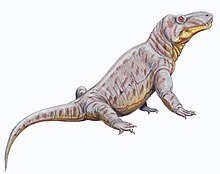Titanosuchus
| Titanosuchus Temporal range: Capitanian,
| |
|---|---|

| |
| Scientific classification | |
| Domain: | Eukaryota |
| Kingdom: | Animalia |
| Phylum: | Chordata |
| Clade: | Synapsida |
| Clade: | Therapsida |
| Suborder: | †Dinocephalia |
| Family: | †Titanosuchidae |
| Genus: | †Titanosuchus Owen, 1876 |
| Species: | †T. ferox
|
| Binomial name | |
| †Titanosuchus ferox Owen, 1879
| |
| Synonyms | |
| |
Titanosuchus ferox ("fierce titan crocodile") is an extinct species of dinocephalian therapsids that lived in the Middle Permian epoch in South Africa.
Along with its close relatives, Jonkeria and Moschops, Titanosuchus inhabited present-day South Africa around 265 million years ago, in the Late Permian. Titanosuchus is frequently cited as being a carnivore;[1] however, this is based on specimens now assigned to Anteosaurus.[2] Instead, Titanosuchus was likely an omnivorous or herbivorous animal like the related Jonkeria. Titanosuchus is known from fragmentary jaw and postcranial material, which can be distinguished from Jonkeria by the greater length of the limb bones.[3]
Parascapanodon and Scapanodon were once thought to be distinct genera, but are now considered to be junior synonyms of Titanosuchus.[4]
See also
[edit]References
[edit]- ^ Palmer, D., ed. (1999). The Marshall Illustrated Encyclopedia of Dinosaurs and Prehistoric Animals. London: Marshall Editions. p. 189. ISBN 1-84028-152-9.
- ^ Kammerer, Christian F. (2011). "Systematics of the Anteosauria (Therapsida: Dinocephalia)". Journal of Systematic Palaeontology. 9 (2): 261–304. doi:10.1080/14772019.2010.492645.
- ^ Jirah, Sifelani; Rubidge, Bruce S.; Abdala, Fernando (11 June 2024). "Cranial morphology of Jonkeria truculenta (Therapsida, Dinocephalia) and a taxonomic reassessment of the family Titanosuchidae". Palaeontologia africana. 58: 1–27. ISSN 2410-4418.
- ^ Boonstra, L. D., 1969, The fauna of the Tapinocephalus zone (Beaufort beds of the Karoo): Annals of the South African Museum, v. 56, part 1, p. 1-73.


